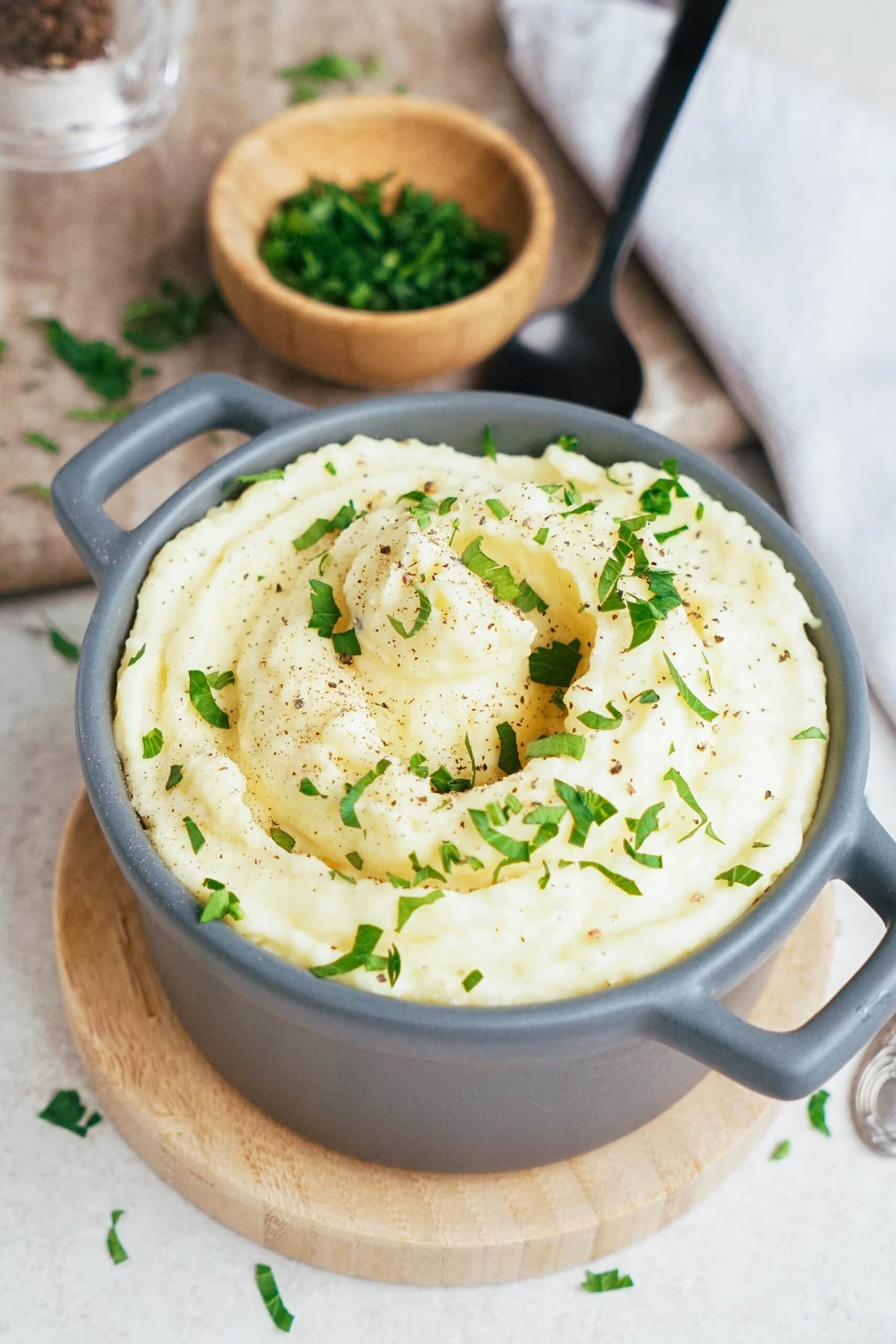Mashed potatoes can last in the refrigerator for 3 to 5 days. Store them in a covered airtight container to maintain freshness.
Mashed potatoes are a staple in many households, known for their creamy texture and comforting taste. Preparing them in advance can save time for busy weeknights or holiday dinners. To ensure the best quality, it’s essential to store your mashed potatoes properly.
Refrigeration slows down bacterial growth, keeping your mashed potatoes safe and delicious for a few days. Always use a clean utensil when serving to avoid introducing bacteria that can spoil the potatoes faster. Remember to let the mashed potatoes cool before refrigerating to prevent condensation that can lead to sogginess. By following these simple storage tips, you can enjoy your mashed potatoes with the peace of mind that they are both safe to eat and tasty.
Shelf Life Of Mashed Potatoes
Understanding the shelf life of mashed potatoes is key. This helps ensure they stay tasty and safe to eat. Let’s dive into what affects their freshness and how long they can last in the fridge.
Factors Affecting Freshness
Mashed potatoes’ freshness depends on several factors:
- Ingredients used: Milk and butter can impact shelf life.
- Storage method: Airtight containers are best.
- Refrigerator temperature: Keep it below 40°F (4°C).
- Exposure to air: Less air means longer freshness.
Typical Refrigeration Duration
Generally, mashed potatoes last in the fridge for:
| Condition | Duration |
|---|---|
| Plain mashed potatoes | 3-5 days |
| Mashed potatoes with additives (like garlic or cheese) | 1-3 days |
Remember, always check for signs of spoilage before eating.

Credit: fridge.com
Storing Mashed Potatoes Correctly
Proper storage is key to keeping mashed potatoes fresh and tasty. Understanding the best practices ensures this popular side dish remains delicious for days. Let’s explore how to store mashed potatoes correctly.
Best Containers For Storage
Choosing the right container is crucial for mashed potato freshness. Air-tight containers are ideal. They prevent odors and keep moisture out. Glass containers with sealing lids work great. For extra protection, wrap the surface with plastic wrap before sealing.
- Air-tight containers – Seal in freshness
- Glass with lids – Prevent flavor loss
- Plastic wrap – Extra moisture barrier
Temperature And Humidity Control
Refrigerators should be set below 40°F (4°C) for safe mashed potato storage. Avoid the refrigerator door. It’s prone to temperature fluctuations. Place mashed potatoes in the main compartment. This area maintains consistent temperature and humidity levels.
| Location | Temperature | Humidity |
|---|---|---|
| Main compartment | Below 40°F (4°C) | Low |
Recognizing Spoilage Signs
Mashed potatoes can be a delightful dish. But, like all foods, they don’t last forever. It’s crucial to know when they’re past their prime. Let’s explore the signs of spoilage to keep your meals safe and delicious.
Visual Cues
Fresh mashed potatoes have a creamy color and smooth texture. With time, they may change. Look for these visual signs:
- Color changes: If you notice any discoloration, like a grey, yellow, or green tint, it’s a bad sign.
- Mold growth: Any fuzzy spots or mold indicates spoilage. Discard the potatoes immediately.
Odor And Texture Changes
Odor and texture are reliable indicators of spoilage. Pay attention to these details:
- Off smell: A sour or unpleasant odor means the mashed potatoes are no good.
- Texture: If they feel slimy or sticky, it’s time to throw them out.
Safety Concerns With Leftover Mashed Potatoes
Understanding safety concerns with leftover mashed potatoes is key.
These creamy delights can pose health risks if not stored properly.
Foodborne Illness Risks
Leftover mashed potatoes can harbor bacteria.
Bacteria grow rapidly at temperatures between 40°F and 140°F.
This temperature range is the danger zone.
Potatoes left out for over two hours at room temperature may become unsafe.
Symptoms of foodborne illness include nausea, vomiting, and diarrhea.
To minimize risk, refrigerate leftovers within two hours of cooking.
Safe Consumption Guidelines
Store mashed potatoes in airtight containers.
Use shallow containers to cool them quickly.
Refrigerate at 40°F or below.
Consume refrigerated mashed potatoes within three to five days.
Reheat leftovers to an internal temperature of 165°F.
Discard any potatoes left at room temperature for over two hours.
When in doubt, throw it out.
Reheating Stored Mashed Potatoes
Perfectly stored mashed potatoes can still lose appeal once reheated. The key to enjoying leftover mashed potatoes is knowing the right reheating techniques. This ensures taste and texture remain as close to fresh as possible.
Methods To Retain Quality
Follow these steps to keep your mashed potatoes delicious:
- Use a Stove: Heat gently with a bit of cream.
- Microwave: Cover the dish; stir occasionally.
- Oven: Reheat at 350°F in a covered dish.
Each method keeps your potatoes moist and fluffy. Always add a splash of milk or cream before reheating. This prevents drying out.
Avoiding Common Reheating Mistakes
Mistakes can turn your mashed potatoes into a disappointing dish. Here’s what to avoid:
| Mistake | Impact | Solution |
|---|---|---|
| High Heat | Dries out potatoes | Reheat on low |
| Skipping Stir | Uneven heat distribution | Stir frequently |
| No Moisture | Potatoes turn hard | Add milk or cream |
Avoid these mistakes to serve reheated mashed potatoes that still taste great.

Credit: savorandsavvy.com
Maximizing Freshness With Additives
Mashed potatoes can last longer with the right additives. This section explores how to keep them fresh. We focus on preservatives and natural enhancers.
Preservatives
Preservatives help mashed potatoes stay good in the fridge. They fight off bacteria.
- Lemon juice: Adds flavor and protects.
- Vinegar: A little bit keeps potatoes fresh.
- Ascorbic acid: Vitamin C powder that stops browning.
Natural Enhancers
Natural enhancers keep the taste and prevent spoilage. They are safe and healthy.
- Garlic: Adds taste and fights bacteria.
- Herbs: Rosemary and thyme add flavor and preserve.
- Olive oil: Coats potatoes, keeping them moist and fresh.
| Additive | Type | Benefit |
|---|---|---|
| Lemon Juice | Preservative | Flavor, Protection |
| Garlic | Natural Enhancer | Taste, Antibacterial |
Creative Uses For Leftover Mashed Potatoes
Wondering what to do with leftover mashed potatoes? You’re in luck! There are many creative uses for those tasty spuds. Let’s dive into some exciting recipes and ideas to transform your leftovers into something amazing.
Recipes And Ideas
Turn your leftover mashed potatoes into new, delicious dishes. Here are some top picks:
- Potato Pancakes: Mix with an egg, some flour, and fry until golden.
- Mashed Potato Muffins: Add cheese and bacon bits, bake in muffin tins.
- Potato Bread: Use the mashed potatoes to make soft, fluffy bread.
Transforming Leftovers
Get creative and give your mashed potatoes a second life. Check out these ideas:
| Leftover Use | Ingredients | Instructions |
|---|---|---|
| Potato Croquettes | Mashed potatoes, cheese, breadcrumbs | Form balls, roll in breadcrumbs, and fry. |
| Shepherd’s Pie | Mashed potatoes, ground meat, veggies | Layer meat and veggies, top with potatoes, and bake. |
These ideas can help turn your mashed potatoes into tasty new meals. Enjoy experimenting!

Credit: laurenslatest.com
Freezing Mashed Potatoes For Long-term Storage
Storing mashed potatoes just got easier with freezing. Let’s dive into how you can extend their shelf life significantly.
Preparation For Freezing
Proper preparation is key to maintaining the quality of mashed potatoes. Follow these simple steps:
- Cool the potatoes to room temperature.
- Stir in a bit of cream or butter for texture.
- Portion the mashed potatoes into freezer-safe bags or containers.
- Label with the date and contents.
- Squeeze out excess air and seal tightly.
- Place in the freezer, lying flat for space efficiency.
Thawing And Reusing Tips
When you’re ready to enjoy your mashed potatoes, thawing them correctly is crucial. Here’s how:
- Transfer the frozen potatoes to the refrigerator overnight.
- For quicker thawing, place in cold water.
- Reheat on the stove or in the microwave.
- Stir well to bring back the original texture.
- Add milk or butter if needed.
Remember, never refreeze thawed mashed potatoes. Enjoy them fresh for best taste.
Frequently Asked Questions
Can I Eat Mashed Potatoes That Have Been In The Fridge For A Week?
It’s generally safe to eat refrigerated mashed potatoes within 3-5 days. After a week, check for spoilage signs before consuming.
How To Know If Mashed Potatoes Have Gone Bad?
Mashed potatoes have gone bad if they exhibit a sour smell, discoloration, or a slimy texture. Discard them if you notice any of these signs.
How Long Can You Keep Cold Mashed Potatoes In The Fridge?
Cold mashed potatoes can be safely stored in the fridge for 3-5 days. Always use an airtight container to maintain freshness.
Can Mashed Potatoes Be Refrigerated And Reheated?
Yes, mashed potatoes can be refrigerated for up to three days and reheated on the stove or in a microwave. Always ensure they’re heated thoroughly before serving.
Conclusion
Storing mashed potatoes properly extends their shelf life in the fridge. Aim for a tight seal and cool temperatures, ensuring up to five days of freshness. Remember, quality and safety go hand in hand—when in doubt, toss them out. Keep these tips in mind to savor your leftovers with peace of mind.




